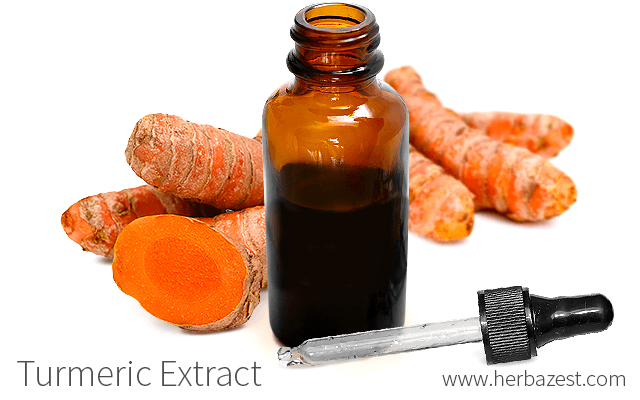Following recent discoveries of its anti-inflammatory, antioxidant nature, several turmeric-based health supplements have come into prominence.
One such supplement is turmeric extract, which offers a convenient liquid dosage that - despite its small size - packs a potent punch of medicinal action. Widely abundant in turmeric extract, curcumin accounts for the majority of its key medicinal properties.
How to Make Turmeric Extract
Though available throughout many retail locations, turmeric extract can be safely and inexpensively prepared at home from the rhizome of the Curcuma longa plant.
Supplies needed for turmeric extract include:
- Fresh turmeric
- Dark-colored mason jar or other glass container
- High proof, non-flavored vodka or other liquor
- Plastic or latex gloves
- Apron
- Cheese grater
- Cheesecloth
Step-by-step process:
- Thoroughly wash the fresh turmeric rhizomes, manually removing all visible impurities.
- Wearing gloves to protect the hands from staining, carefully mince or grate the turmeric.
- Transfer fresh turmeric to the mason jar and pour the vodka over it until the jar is just about full.
- Tightly screw on the lid and store in a cool, dark place, agitating the newly-formed turmeric extract once every few days.
- After three to five weeks, strain the turmeric extract using a cheesecloth or coffee filter, and discard the solid pieces.
To limit toxicity, it is recommended to consume no more than 25 drops of turmeric extract daily. Furthermore, patients using other drugs and medications to fight specific illnesses are advised to speak with a qualified health professional before preparing turmeric extract for household medicinal use.
Benefits of Turmeric Extract
Commonly used for dental care and relieving rheumatoid arthritis symptoms, turmeric extract works against pain and inflammation by lowering histamine levels, reducing swelling, and soothing away soreness and sensitivity.1,2 Several recent studies on turmeric have shown that it helps reduce the size of the human gallbladder and provide relief from the pain and discomfort of irritable bowel syndrome.
In addition, turmeric extract benefits the body through several preventative measures. As an antioxidant that plays a key role in cellular communication, turmeric extract helps to protect the body's cells from free radical damage by blocking key compounds thought to be responsible for the process of aging. For this reason, turmeric extract may demonstrate efficacy in the treatment or prevention of Alzheimer's disease and other neurodegenerative illnesses.3
Turmeric extracts help prevent diabetes by improving the function of insulin-producing beta cells and lowering blood sugar levels. Meanwhile, for the prevention of cardiovascular disease, turmeric extract's anti-coagulant action lowers the risk of blood clots by improving blood flow.4 Moreover, curcumin in turmeric extract - the main healing compound - helps protect the liver by helping it to expel bile and thoroughly rid itself of toxins.5
Modern science has recently corroborated what the ancient Chinese and Indian cultures have known all along - that turmeric is a wonderful plant with seemingly magical healing potential. Providing great rewards in exchange for minimal hassle, taking turmeric extract is one of the best ways to reap the many health benefits of turmeric.
Sources
- Atherosclerosis, Oral administration of a turmeric extract inhibits LDL oxidation and has hypocholesterolemic effects in rabbits with experimental atherosclerosis, 1999
- Herbal Medicine: Biomolecular and Clinical Aspects, Chapter 13: Turmeric, the golden spice, 2011
- FAOSTAT, Chemical and Technical Assessment: Curcumin
Footnotes:
- Oral Health & Preventive Dentristry. Efficacy of curcumin in the treatment of chronic gingivitis: a pilot study. Retrieved November 22, 2021, from: https://pubmed.ncbi.nlm.nih.gov/23507685/
- Phytotherapy Research. (2012). A randomized, pilot study to assess the efficacy and safety of curcumin in patients with active rheumatoid arthritis. Retrieved November 22, 2021, from: https://pubmed.ncbi.nlm.nih.gov/22407780/
- Journal of Experimental Pharmacology. (2013). Curcumin: a natural substance with potential efficacy in Alzheimer's disease. Retrieved November 22, 2021, from: https://www.ncbi.nlm.nih.gov/pmc/articles/PMC4863538/
- The International Journal of Biochemistry & Cell Biology. (2009). Potential therapeutic effects of curcumin, the anti-inflammatory agent, against neurodegenerative, cardiovascular, pulmonary, metabolic, autoimmune and neoplastic diseases. Retrieved November 22, 2021, from: https://pubmed.ncbi.nlm.nih.gov/18662800/
- Gastroenterology and Hepatology form Bed to Bench. (2018). Comparing different non-invasive methods in assessment of the effects of curcumin on hepatic fibrosis in patients with non-alcoholic fatty liver disease. Retrieved November 22, 2021, from: https://www.ncbi.nlm.nih.gov/pmc/articles/PMC6347983/




